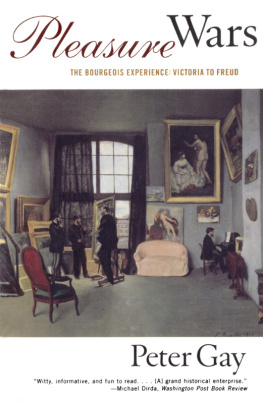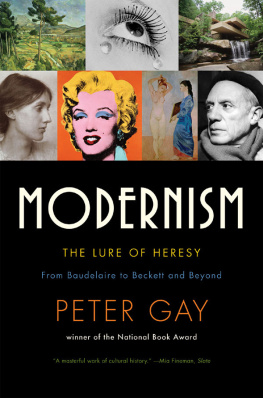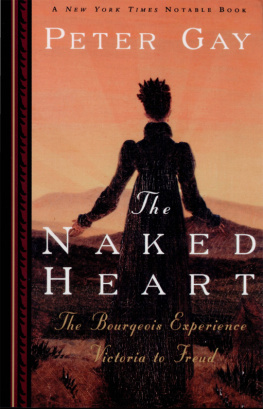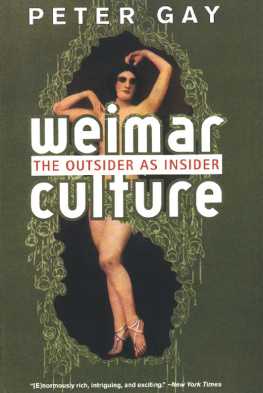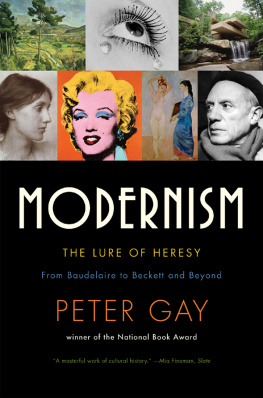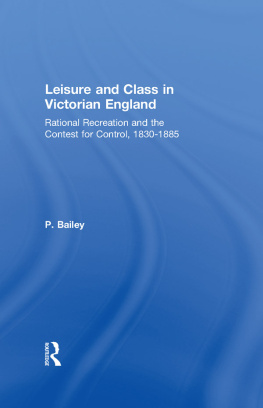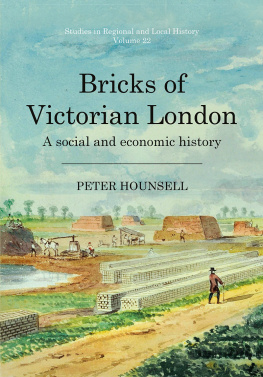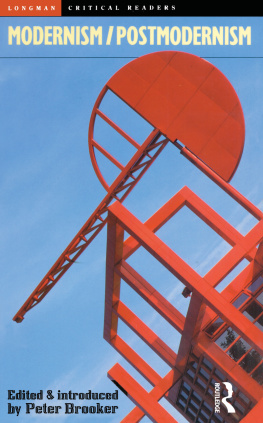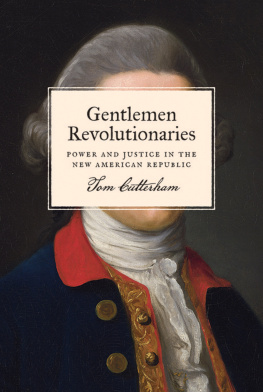BOOKS BY PETER GAY
The Bourgeois Experience: Victoria to Freud
Education of the Senses (1984)
The Tender Passion (1986)
The Cultivation of Hatred (1993)
The Naked Heart (1995)
Pleasure Wars (1998)
Reading Freud: Explorations and Entertainments (1990)
Freud: A Life for Our Time (1988)
A Godless Jew:
Freud, Atheism, and the Making of Psychoanalysis (1987)
Freud for Historians (1985)
Freud, Jews and Other Germans:
Masters and Victims in Modernist Culture (1978)
Art and Act: On Causes in HistoryManet, Gropius, Mondrian (1976)
Style in History (1974)
Modern Europe (1973), with R. K. Webb
The Bridge of Criticism: Dialogues on the Enlightenment (1970)
The Enlightenment: An Interpretation
Vol. II The Science of Freedom (1969)
Weimar Culture: The Outsider as Insider (1968)
A Loss of Mastery: Puritan Historians in Colonial America (1966)
The Enlightenment: An Interpretation
Vol. I The Rise of Modern Paganism (1966)
The Party of Humanity: Essays in the French Enlightenment (1964)
Voltaires Politics: The Poet as Realist (1959)
The Dilemma of Democratic Socialism:
Eduard Bernsteins Challenge to Marx (1952)
Pleasure Wars
The Bourgeois Experience
VICTORIA TO FREUD

VOLUME V

Copyright 1998 by Peter Gay
All rights reserved.
First published as a Norton paperback 1999
For information about permission to reproduce selections from this book,
write to Permissions, W. W. Norton & Company, Inc.,
500 Fifth Avenue, New York, NY 10110.
Library of Congress Catalog Card Number: 838187
ISBN 978-0-393-24353-6 (e-book)
W.W. Norton & Company, Inc., 500 Fifth Avenue, New York, NY 10110
www.wwnorton.com
W.W. Norton & Company Ltd., 10 Coptic Street, London WC1A 1PU
FOR
RUTHIE
Contents
Bourgeois, I observed, is an epithet which the riff-raff apply to what is respectable, and the aristocracy to what is decent.
Anthony Hope, [pseud. Sir Anthony Hope Hawkins], Dolly Dialogues, 1894
Der heuchlerische Anschein, mit dem alle brgerlichen Ordnungen bertncht sind, wie als ob sie Ausgeburten der Moralitt wrenz. B. die Ehe; die Arbeit; der Beruf; das Vaterland; die Familie; die Ordnung; das Recht. Aber da sie insgesamt auf die mittelmssigste Art Mensch hin begrndet sind, zum Schutz gegen Ausnahmen und Ausnahme-Bedrfnisse, so muss man es billig finden, wenn hier viel gelogen wird.
Friedrich Nietzsche, Nachlass
Bourgeois, vous avezroi, lgislateur ou ngociantinstitu des collections, des muses, des galeries. Quelques-unes de celles qui ntaient ouvertes il y a seize ans quaux accapareurs ont largi leurs portes pour la multitude. Vous vous tes associs, vous avez form des compagnies et fait des emprunts pour raliser lide de lavenir avec toutes ses formes diverses, formes politique, industrielle et artistique. Vous navez jamais en aucune noble entreprise laiss linitiative la minorit protestant et souffrante, qui est dailleurs lennemie naturelle de lart.
Charles Baudelaire, Salon de 1846
Pleasure Wars
In the Victorian decades, the name bourgeois was at once a term of reproach and a source of self-respect. Although many members of the middle class took pride in their status, it was leavened with a good deal of uneasiness; for them, an age of confidence was also an age of anxiety. Moderating between the aristocracys persistent claims to preeminence in politics, society, and high culture and an increasingly restive working class pressing for a living wage and the vote, to be middling took hold less as a compromise than as a widely supported bourgeois ideology.
This was the style of thinking that the French critic Emile Faguet explored looking back in 1890 on the career of Franois Guizotprolific historian, educational reformer, briefly prime minister under King Louis Philippe during the July Monarchy. Guizot, he wrote, not without justice, invented the party, the government, and the doctrine of the juste milieu. During the years he wielded influence, Faguet noted, the bourgeoisie interpreted and expressed the national will. The lower class can feel but not speak; the upper class can speak but, too remote from public life, has nothing of value to say.1 Radicals did not thank him for it, but Guizots political stance informed most middle-class politicians in the nineteenth century, though not without facing severe criticism.
And Alfred Krupp, the most energetic in the family clan of Germanys foremost armament manufacturers, declared that he would rather be the first among industrialists than the last among knights.2 His attitude was anything but eccentric among confident Victorian bourgeois.
From the age of the Reformation onward, portraits of commercial men, even of moneylenders, had spoken of an unapologetic ease in their rank; the road from portraits by Holbein to those by Degas is straight and short. In the age of the Enlightenment, social commentators like Addison and Voltaire singled out the pacific, unheroic, trading middle class for praise. And a virtual epidemic of town hall building raced across European and American cities after mid-nineteenth century; from the 1850s on, literally scores were built, some of them very grand, in Munich and Manchester, Berlin and Paris and smaller towns elsewhere. They document not merely the multiplying functions of urban bureaucracies but also the bourgeoisies claims to high esteem and even power, and at times defiance of its noble betters.
Admittedly, in every country except perhaps in France, political leaders of the nineteenth-century bourgeoisie showed themselves downright diffident and opportunistic in the struggle for political preeminence. Again and again they allowed themselves to be co-opted for dubious rewards.English middle classes, firmly set, it would seem, on their way to hegemony, recorded failuresor, perhaps better, almost deliberate refusals to succeedin taking power. As late as the 1890s, Friedrich Engels was astonished at what he thought the meekness of prosperous English merchants and manufacturers as they capitulated to the gentry and the landed aristocracy in Parliament. Despite all this, the growing prominence of the bourgeoisie in the production of wealth, the arena of politics, and the shaping of social habits was beyond dispute. When, around 1840, Heinrich Heine called his time an industrial, bourgeois age, he was voicing a generally held perception.3
In 1836, narrowing this claim to his own country, the French travel writer and public servant Michel Chevalier announced that today it is universally recognized that the middle class rules in France.4 He too, like Heine, could count on his readers assent. Was not King Louis Philippe, the embodiment of his regime with his ubiquitous umbrella, little more than the executive agent of a bourgeois financial elite? Had French nobles not fled to their landed estates and left the work of governing to bankers, entrepreneurs, and publishers? In this fostering climate, reaching far beyond France, historians found it hard to resist elevating into a commonplace the image of a bourgeoisie rising steadily through the centuries, an explanation that, explaining too much, actually explained very little.
But it proved hard to confine the bourgeoisie to a simple definition. Reasonable observers of contemporary society acknowledged that if the bourgeoisie was a reality rather than a construct devised to save time and mental effort, it was necessarily subtly stratified, often distinctly rent into mutually hostile cliques. They could cite persuasive evidence that it was not
Next page
